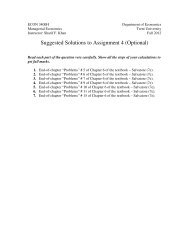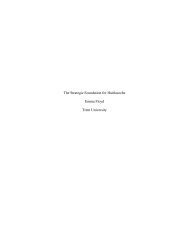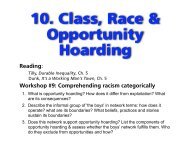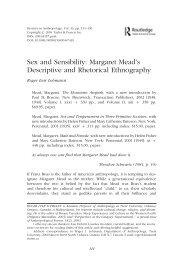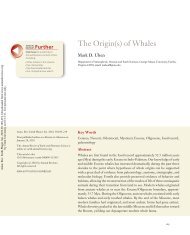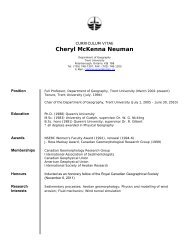REO FORTUNE'S PSYCHOLOGICAL THEORY OF CULTURAL ...
REO FORTUNE'S PSYCHOLOGICAL THEORY OF CULTURAL ...
REO FORTUNE'S PSYCHOLOGICAL THEORY OF CULTURAL ...
You also want an ePaper? Increase the reach of your titles
YUMPU automatically turns print PDFs into web optimized ePapers that Google loves.
280 Pacifi c Studies, Vol. 32, Nos. 2/3—June/Sept. 2009<br />
[One] organizes information in terms of verbal categories and<br />
semantic understandings and [the other] records and organizes all<br />
information according to its emotional significance. . . . What is<br />
usually available to waking consciousness is only the semantic/<br />
language register of memory. (Stephen 2003, 97)<br />
Here, then, is an elaboration compatible with Fortune’s model of dual<br />
belief systems that provides an opportunity for ambivalence in each individual’s<br />
self-image and cultural repertoire. Each person has, as it were, two<br />
cultures, one based on emotional connections, and the other based on logical<br />
connections among representations. The dialectic between dreaming<br />
and alert consciousness brings the two alternately into view (see Lohmann<br />
2003: 206–7).<br />
Fortune’s Minds<br />
Fortune revealed much about his personality, beliefs, and attitudes in<br />
the course of demonstrating his psychological ideas about dreaming. Six of<br />
the sample dreams he provided are his own. Here I recount them and his<br />
commentary about them in order to capture a glimpse of his youthful<br />
attitudes.<br />
The Dream of the German Broil<br />
In this dream, set in the time of the Great War, Fortune was trying to<br />
decide whether to attend college in Germany or France (Fortune 1927:<br />
5–22). In the dream, he had relatives in both places, and both countries<br />
were located in his hometown in New Zealand. The French college was in<br />
a flat area in the middle of town, affording convenient access. The German<br />
college was perched atop a high hill outside of town, accessible only by<br />
tram. He decided, in spite of the inconvenience, to attend the college in<br />
the enemy nation, Germany, in order to show his “freedom from the narrow<br />
nationalistic prejudices then convulsing the world” (Fortune 1927, 6). Upon<br />
arrival in Germany, he was ignored and ridiculed by his relatives, his former<br />
school principal, and others. Upon taking the tram to campus, he had only<br />
English money to pay, which was rejected. Finally, the driver took him to<br />
the college, only to crash the tram through the front door, and throw the<br />
hapless Fortune into a giant metal basket hung from the ceiling, before<br />
withdrawing and taking the tracks with him, leaving no way of escape.<br />
Fortune was harassed by various officials, and then thrown out the door.<br />
pacs-32-02-06.indd 280 9/7/2009 2:32:33 PM



